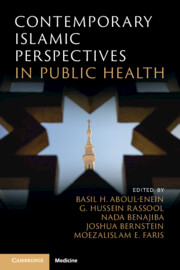Book contents
- Contemporary Islamic Perspectives in Public Health
- Reviews
- Contemporary Islamic Perspectives in Public Health
- Copyright page
- Contents
- Contributors
- About the Editors
- Acknowledgments
- Chapter 1 Introduction to Islam
- Chapter 2 The Qur’an and Prophetic Guidance: An Overview in the Context of New Public Health
- Chapter 3 Islamic Applications towards Public Health Policies: A Brief Perspective
- Chapter 4 Islamic Prayer (Salat) and Health
- Chapter 5 Perceptions of Health Behaviors and Illness in Muslims
- Chapter 6 Social Justice, Human Rights, and Equality: An Islamic Perspective
- Chapter 7 Public Health, Hygiene, and Islam
- Chapter 8 Foods of the Qur’anic Garden: An Islamic Perspective
- Chapter 9 Recommended Eating and Dietary Practices in Islam
- Chapter 10 Islamic Food Law and Dietary Restrictions
- Chapter 11 Ramadan Intermittent Fasting: A Contemporary Health Perspective
- Chapter 12 Promoting Oral Health: Influences of Hadith and Sunnah
- Chapter 13 Coping and Mental Health: Islamic Practices and Beliefs
- Chapter 14 Maternal and Child Health: An Islamic Perspective
- Chapter 15 Immunization and Islamic Guidance
- Chapter 16 Sexual and Reproductive Health: An Islamic Perspective
- Chapter 17 Zakat and Waqf: Towards Achieving Sustainability, Health, and Well-Being
- Chapter 18 Earth and the Environment: Islam and Stewardship
- Chapter 19 Sleep and Health: An Islamic Perspective
- Chapter 20 Addictive Behaviors and Public Health
- Chapter 21 Highlighting the Concepts, Principles, and Values of Communication: A Brief Islamic Perspective
- Chapter 22 Contemporary Public Health, Islam, and Positive Health
- Chapter 23 Cultural Competence in Public Health: A Brief Islamic Perspective
- Chapter 24 Muslims and Non-Muslims: Perspectives on Immigrant and Minority Health
- Chapter 25 Challenges and Solutions in Public Health: An Islamic Perspective
- Index
- References
Chapter 20 - Addictive Behaviors and Public Health
Published online by Cambridge University Press: 02 January 2025
- Contemporary Islamic Perspectives in Public Health
- Reviews
- Contemporary Islamic Perspectives in Public Health
- Copyright page
- Contents
- Contributors
- About the Editors
- Acknowledgments
- Chapter 1 Introduction to Islam
- Chapter 2 The Qur’an and Prophetic Guidance: An Overview in the Context of New Public Health
- Chapter 3 Islamic Applications towards Public Health Policies: A Brief Perspective
- Chapter 4 Islamic Prayer (Salat) and Health
- Chapter 5 Perceptions of Health Behaviors and Illness in Muslims
- Chapter 6 Social Justice, Human Rights, and Equality: An Islamic Perspective
- Chapter 7 Public Health, Hygiene, and Islam
- Chapter 8 Foods of the Qur’anic Garden: An Islamic Perspective
- Chapter 9 Recommended Eating and Dietary Practices in Islam
- Chapter 10 Islamic Food Law and Dietary Restrictions
- Chapter 11 Ramadan Intermittent Fasting: A Contemporary Health Perspective
- Chapter 12 Promoting Oral Health: Influences of Hadith and Sunnah
- Chapter 13 Coping and Mental Health: Islamic Practices and Beliefs
- Chapter 14 Maternal and Child Health: An Islamic Perspective
- Chapter 15 Immunization and Islamic Guidance
- Chapter 16 Sexual and Reproductive Health: An Islamic Perspective
- Chapter 17 Zakat and Waqf: Towards Achieving Sustainability, Health, and Well-Being
- Chapter 18 Earth and the Environment: Islam and Stewardship
- Chapter 19 Sleep and Health: An Islamic Perspective
- Chapter 20 Addictive Behaviors and Public Health
- Chapter 21 Highlighting the Concepts, Principles, and Values of Communication: A Brief Islamic Perspective
- Chapter 22 Contemporary Public Health, Islam, and Positive Health
- Chapter 23 Cultural Competence in Public Health: A Brief Islamic Perspective
- Chapter 24 Muslims and Non-Muslims: Perspectives on Immigrant and Minority Health
- Chapter 25 Challenges and Solutions in Public Health: An Islamic Perspective
- Index
- References
Summary
The use of psychoactive substances (legal, illegal, or prescribed) continues to be a major public health problem. The prevalence of alcohol and drug use/abuse among Muslims is extremely difficult to determine as it relies upon self-reporting and is a stigmatized behavior. While alcohol and drug consumption are ostensibly forbidden in Islam, some Muslims drink alcohol and take psychoactive substances. Islam takes a strong prohibitive stance and forbids all intoxicants (alcohol, drugs, and tobacco), regardless of the quantity or kind, because any substance that harms the body is prohibited. Islam established a zero-tolerance policy towards addictions. The public health approach in the response to addiction began in the seventh century during the first Islamic caliphate and is based on an abstinence model. In contrast to the abstinence model, due to the increased use of drugs and injecting behavior (and the control of HIV), harm reduction approaches have been adopted by few in the Islamic world.
- Type
- Chapter
- Information
- Contemporary Islamic Perspectives in Public Health , pp. 124 - 129Publisher: Cambridge University PressPrint publication year: 2025

